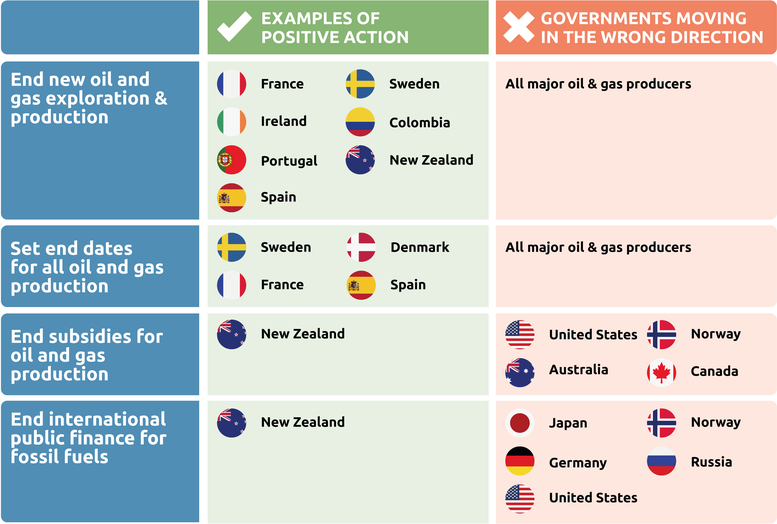Countdown to COP28: time for world to focus on oil and gas phase-out, renewables target, not distractions like CCS
Attachments
COP28 must focus on oil and gas phase-out, not distractions like CCS
COP28 in the UAE needs to send a clear signal towards ambitious climate action. It requires a phase-out of oil and gas production, new global targets on renewables and fewer distractions from topics like CCS or co-firing old combustion technology with synthetic fuels from renewable sources.
This briefing assesses recent action from national governments to start phasing out oil and gas production and support renewable electricity—or those that are promoting distractions like CCS.
The Climate Action Tracker has found:
- None of the world’s largest fossil fuel producers have committed to ending new investments in oil and gas production and are instead increasing them.
- Developed countries must lead the way and set end dates for oil and gas production—only minor producers are doing so.
- Most governments have failed to eliminate fossil fuel subsidies despite longstanding promises to do so.
- G7 members continue to support international public finance for fossil gas despite pledging to end new international public finance for fossil fuels in 2022.
To initiate the end of oil and gas production, the CAT has identified four main actions and checked whether national governments are following them:
The current system works for the rich
Oil and gas exploration, production and trade washed record and windfall profits into the pockets of corporations in 2022. The big western oil companies alone paid out USD 110bn in dividends and share repurchases (Reuters, 2023a)— a number higher than the global climate finance target of the Paris Agreement of USD 100bn by 2020, which developed countries have still not met.
Oil and gas majors have dumped their plans to reduce investment in production, increasing it instead. At the same time many developing countries still lack access to clean and affordable energy and around the world, people increasingly suffer from energy poverty, at least in part exacerbated by high fossil fuel prices and lack of finance for renewables.
Major oil and gas producers promote technologies that simply prolong oil and gas production
The CAT also finds that major oil and gas producers promote technologies that simply enable prolonging oil and gas production and distract from the real need to halve greenhouse gas emissions by 2030 and reduce global production of fossil fuels.
CAT determines that:
- Carbon capture and storage cannot be a lifeline for oil and gas: The UAE, as the world’s 7th largest oil and 15th largest fossil gas producer, has officially been promoting an “emissions-free” fossil fuel agenda – touting the use of CCS in the energy sector rather than phasing out oil and gas.
- Co-firing fossil fuels with renewable resources will never be competitive: Several governments are now promoting the use of fuels made from renewable electricity to reduce fossil fuel use in existing infrastructure—with a clear risk they will end up running on fossil fuels.
Electricity generation needs to rapidly transition to zero emissions
To meet sustainable development goals and stay below the Paris Agreement’s temperature limit, electricity generation needs to rapidly transition to zero emissions, primarily through renewable energy.
The CAT finds governments have not taken sufficient action on three important elements:
- National renewable electricity targets need to be more ambitious, Paris-aligned, inclusive and push implementation.
- The creation of favourable conditions for increased renewable energy uptake is advancing, but also lagging behind in some countries.
- Phase-out targets for coal-fired electricity generation and moratoriums on new coal plants are becoming more widespread, but some major players have failed to act.
A more ambitious global renewable energy target is needed
If a global target on renewable expansion is set, it should clearly be a value that is larger than 1 TW added capacity per year on average, starting from today and for coming decades. This will support a full phase-out of fossil fuels in the electricity sector.
Recently, different policy makers and civil society organisations have started to call for a global renewable electricity target. For it to be effective, the global target needs to be ambitious enough to drive rapid change.
Find out more
To learn more, please read the full briefing by clicking the button below. You can also find our latest country assessments here.
Stay informed
Subscribe to our newsletter

